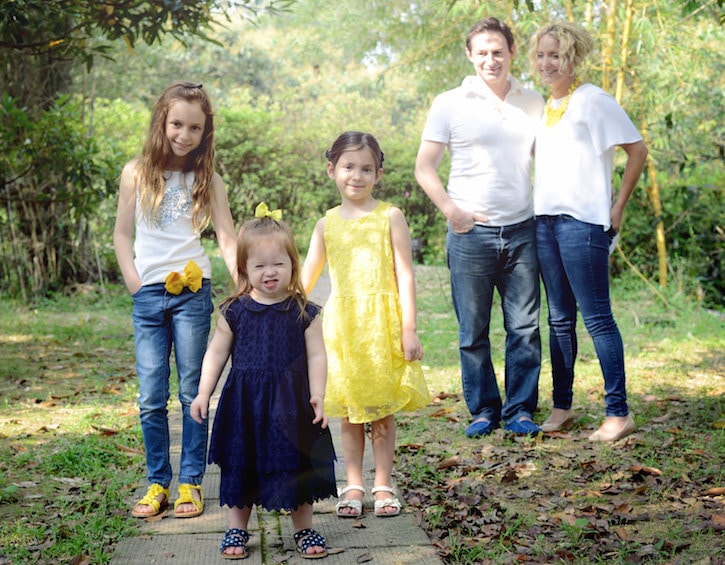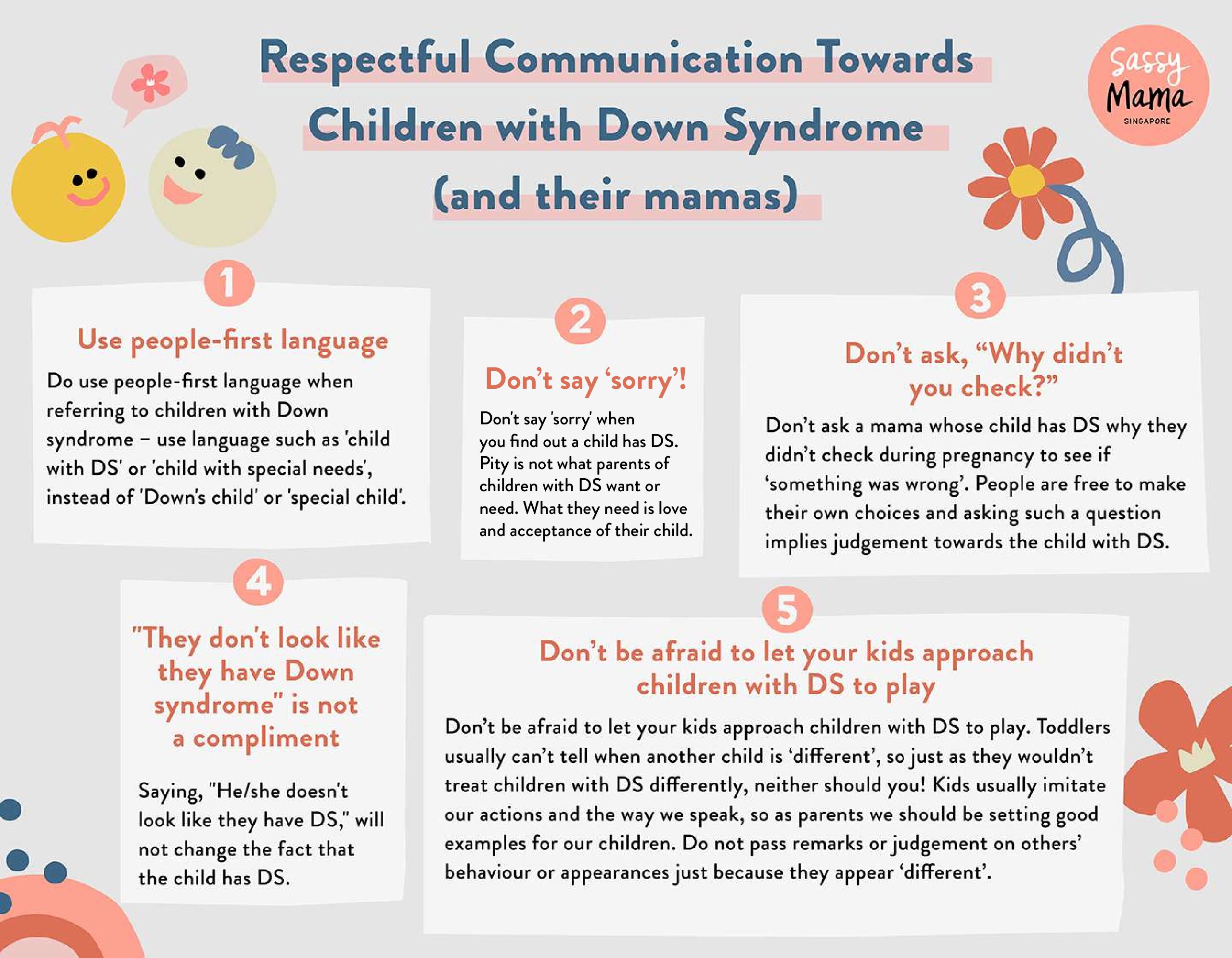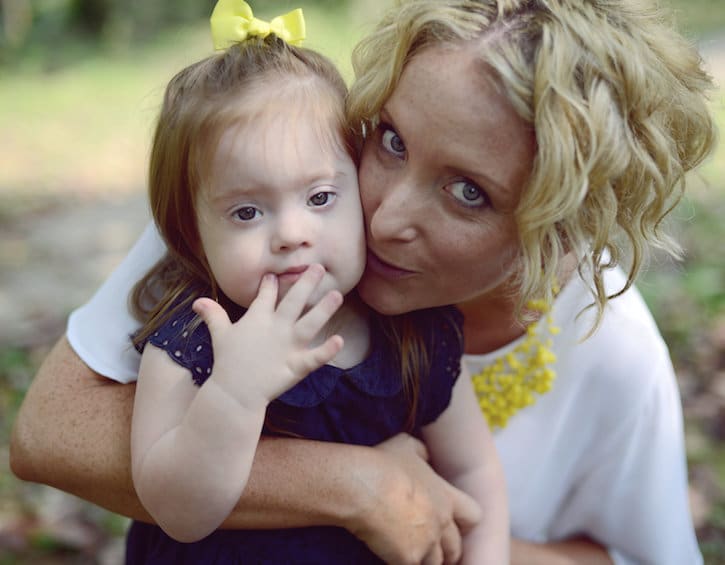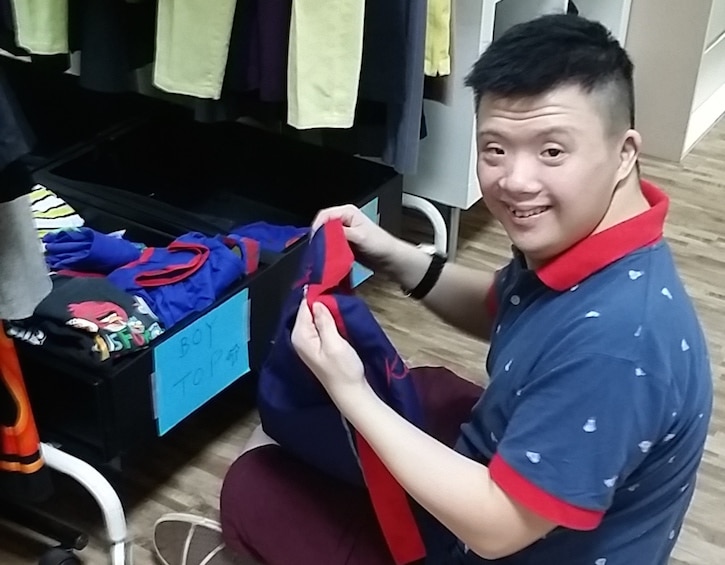
 Post Category - WellnessWellness - Post Category - HealthHealth
Post Category - WellnessWellness - Post Category - HealthHealthTo celebrate World Down Syndrome Day on 21 March, we share FAQs on Down syndrome, personal stories from mamas and Nurjihan shares respectful communication towards children with Down syndrome
World Down Syndrome Day, a global event to raise awareness and exemplify the abilities of persons with Down syndrome, falls on 21 March. The theme this year is ‘End the Stereotypes’ and we just love the advert ‘Assume That I Can‘ (defo watch it if you haven’t already!) that has been released for the campaign. We want to help raise awareness of how to support those with Down syndrome so we list out the answers to the most commonly asked questions about Down syndrome, ways in which you can lend support and we get firsthand tips from a Singaporean mama, Nurjihan on how to respectfully communicate with children with DS.
Jump to:
–Fast Facts about Down syndrome
-Respectful communication towards children with Down syndrome (and their mamas)
-Read personal stories from mamas of kids who have Down syndrome
–Ways that you can support Down syndrome awareness
Respectful communication towards children with Down syndrome (and their mamas)
 We love Singaporean mama Nurjihan‘s fashionable style posts on Instagram, but even more inspiring is how open this T21 mama is with sharing about her son Izzul, who has Down syndrome. Here are her top tips on the best ways to respectfully communicate with children with Down syndrome and mamas whose children have Down syndrome. Click here to view our handy communication chart!
We love Singaporean mama Nurjihan‘s fashionable style posts on Instagram, but even more inspiring is how open this T21 mama is with sharing about her son Izzul, who has Down syndrome. Here are her top tips on the best ways to respectfully communicate with children with Down syndrome and mamas whose children have Down syndrome. Click here to view our handy communication chart!
1. Use people-first language
Do use people-first language when referring to children with Down syndrome – use language such as ‘child with DS’ or ‘child with special needs’, instead of ‘Down’s child’ or ‘special child’.
2. Don’t say ‘sorry’!
Don’t say ‘sorry’ when you find out a child has DS. Pity is not what parents of children with DS want or need. What they need is love and acceptance of their child.
3. Don’t ask, “Why didn’t you check?”
Don’t ask a mama whose child has DS why they didn’t check during pregnancy to see if ‘something was wrong’. People are free to make their own choices and asking such a question implies judgement towards the child with DS.
4. “They don’t look like they have Down syndrome” is not a compliment
Saying, “He/she doesn’t look like they have DS,” will not change the fact that the child has DS.
5. Don’t be afraid to let your kids approach children with DS to play
Don’t be afraid to let your kids approach children with DS to play. Toddlers usually can’t tell when another child is ‘different’, so just as they wouldn’t treat children with DS differently, neither should you! Kids usually imitate our actions and the way we speak, so as parents we should be setting good examples for our children. Do not pass remarks or judgment on others’ behaviour or appearances just because they appear ‘different’.
Read personal stories from mamas whose kids have Down syndrome

- Niamh Daniel, whose daughter Essie has Down syndrome says “To mark World Down Syndrome Day I wanted to reflect on the irrational fear that was sparked in our family by the very mention of the condition. I say irrational because, as my husband and I now realize, it was a fear that was without any rooting in actual fact or knowledge.” Read her story here.
- Meet Anna Tingzon, a mother to a daughter who has Down syndrome. Anna started up a home-based venture 21 Extra Goodness with a mission to raise awareness of kids with Down syndrome. This social venture is her passion and Anna advocates for a more inclusive society for all. Her wish with 21 Extra Goodness is to give hope and assurance to new mothers that everything will be OK with the right support and appropriate intervention for their child. Read her story here.
Supporting Enterprises that Help Inclusive Communities:
Down Syndrome Association (Singapore) is a non-profit social service that supports and educates families and the public about the genetic condition. They are committed to providing holistic support for families and facilitating a person with Down syndrome to attain their full potential. You can support them by making a donation here.
Here are some ways that you can celebrate Down Syndrome Awareness:

- Take part in the Lots Of Socks campaign. On 21 March wear odd socks. This movement aims to remind others that differences can be beautiful. Wear colourful mismatched socks to embrace differences and show support for the Down Syndrome community. Chosen for their resemblance to chromosomes, colourful mismatched socks represent the diverse capabilities of individuals with Down Syndrome. The idea is to get people talking about World Down Syndrome Day (WDSD), 21 March and all year round.
-
Purchase DSA socks designed by DSA members with Down syndrome here.
-
Post about Down Syndrome Awareness.
Use #DownSyndromeAwarenessMonth on social media to share information and to highlight the contributions of people with Down syndrome to our society. Use the tag @downsyndromesingapore, including hashtags #WorldDownSyndromeDay #Endthestereotypeswearejustlike you and #RockYourSocks -
Take part in WDSD Carnival 2024. Down Syndrome Association will hold a WDSD 2024 Carnival at One Punggol from 8am to 3pm on Saturday, 23 March 2024. A highlight of the carnival is the signature Buddy Walk, a 1km walk symbolising camaraderie along the journey of development with individuals with Down Syndrome, together with their families. The event will also feature talent showcases by members with Down Syndrome and community partners, including games and stalls selling crafts and food items.
-
Raise Funds for DSA. Get involved and set up a fundraising campaign to support DSA’s rallies for the community and help raise awareness of Down Syndrome at fundraising portals such as www.giving.sg/home or www.give.asia
Down syndrome: fast facts
- Trisomy 21, also known as Down syndrome is the result of extra chromosomal material.
- Down syndrome is a genetic disorder that occurs in about one in every 800 babies in Singapore.
- Down syndrome affects people of all economic, educational, cultural, ethnic and racial categories.
- The chance a baby will have Down syndrome increases with the age of the mother, however, 80% of babies with Down syndrome are born to women 35 years old and younger simply because women in that age group have the most babies.
- Down syndrome causes developmental delays and, typically, mild to moderate cognitive impairment. Both, however, range across a broad span and the degree of delay and impairment is highly individual.
- Children with Down syndrome can and do learn. They are often avid students and learn to read, write, do math and more alongside their typical peers. They commonly graduate from high school and, increasingly, pursue post-secondary educational opportunities. This is why it is so powerful to assume that they can!
- Most people with Down syndrome have cognitive delays that are mild to moderate. Children with Down syndrome fully participate in public and private educational programs. Educators and researchers are still discovering the full educational potential of people with Down syndrome.
- Life expectancy for individuals with Down syndrome has increased dramatically in recent years, with the average life expectancy approaching that of peers without Down syndrome.
- People with Down syndrome have feelings just like everyone else in the population. They experience the full range of emotions. They respond to positive expressions of friendship and they are hurt and upset by inconsiderate behavior.
- Being a parent is challenging, regardless of the capabilities of the child. This is also true for children with Down syndrome. However, many parents of children with Down syndrome consider their lives full, happy and rich. All children – both with and without Down syndrome – are cherished.
- If your child has Down syndrome, you are not alone. You are now part of a large, caring community whose hallmark is our ability to reach out to each other. To laugh and cry, to share information and help each other along a road that, at times, seems impossibly long and hard, but is mostly wonderfully rewarding.
Read more:
Ultimate Guide to Special Needs Schools & Early Intervention Programs in Singapore
Meet Four Thriving Singaporeans with DS






 View All
View All




 View All
View All









 View All
View All








